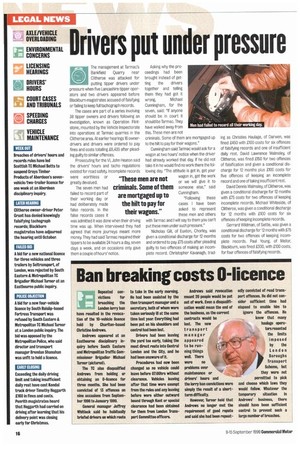Ban breaking costs 0-licence
Page 18

If you've noticed an error in this article please click here to report it so we can fix it.
Repeated con victions for breaching the London lorry ban have resulted in the revocation of the 10-vehicle licence held by Charlton-based Christine Andrews.
Andrews appeared at an Eastbourne disciplinary inquiry before South Eastern and Metropolitan Traffic Commissioner Brigadier Michael Turner (pictured).
The TC also disqualified Andrews from holding or obtaining an 0-licence for three months. She had been convicted of 13 offences on nine occasions from September 1998 to January 1999.
General manager Jeffrey Whitlock said he habitually briefed drivers on which route to take in the early morning. He had been assisted by the then transport manager and a secretary, both of whom were taken seriously ill at the same time last year. Everything had been put on his shoulders and control had been lost.
Drivers had been leaving the yard tee early, taking the most direct route into Central London and the City, and he had been unaware of it.
Procedures had new been changed so no vehicle could leave before ll7:00hrs without clearance. Vehicles leaving after that time were exempt from the rules and any leaving before were either outward hound through Kent or special clearance had been obtained for them from London Transport Committee officers. Andrews said revocation meant 20 people would be put out of work. Even a disqualification would mean the end of the business, as the current
contracts would lost. The new transport manager appeared to be running things well. There
were no problems over maintenance or drivers' hours and the lorry ban convictions were simply the result of a shortterm difficulty.
However, Turner held that Andrews no longer met the requirement of good repute and said she had been repeat edly convicted of read transport offences. He did not consider sufficient time had elapsed to enable him to ignore the offences. He knew that many haulage opera tors resented the limits imposed by the Landon Boroughs Transport Scheme, but they were not permitted to pick and choose which laws they would follow. Whatever the temporary situation in Andrews' business, there should have been sufficient control to prevent such a large number of breaches.












































































































